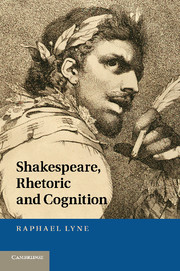Book contents
- Frontmatter
- Contents
- Acknowledgments
- Chapter 1 Introduction: ‘pity, like a naked new-born babe’
- Chapter 2 Metaphor and synecdoche in cognition
- Chapter 3 The drift towards cognition in rhetorical manuals
- Chapter 4 A Midsummer Night’s Dream
- Chapter 5 Cymbeline
- Chapter 6 Othello
- Chapter 7 The Sonnets
- Conclusion
- Notes
- Bibliography
- Index
Conclusion
Published online by Cambridge University Press: 07 September 2011
- Frontmatter
- Contents
- Acknowledgments
- Chapter 1 Introduction: ‘pity, like a naked new-born babe’
- Chapter 2 Metaphor and synecdoche in cognition
- Chapter 3 The drift towards cognition in rhetorical manuals
- Chapter 4 A Midsummer Night’s Dream
- Chapter 5 Cymbeline
- Chapter 6 Othello
- Chapter 7 The Sonnets
- Conclusion
- Notes
- Bibliography
- Index
Summary
A cognitive approach to metaphor and simile proved suggestive, in the preceding chapter, as a way of exploring the ways in which the Sonnets achieved their dazzling insights into emotion partly by means of rhetorical stretches and strains. The experience of rhetoric might seem to be essentially different in a poem, when compared to the dynamic embodiment of the theatre. In fact, the kind of close analysis being explored in this book translated across sufficiently well to provide an answer to its opening question: is cognitive rhetoric, in Shakespeare, a predominantly dramatic phenomenon? Perhaps not.
This brief conclusion offers an opportunity to consider another emerging question, which is, whether this should be seen as a predominantly or uniquely Shakespearean phenomenon. In proposing a negative answer – and thus the extendability of the approach – the point will not be to undermine the extraordinariness of Shakespeare’s language. No other writer has been described so persistently in the terms that motivated the study – no other body of criticism so often pronounces itself astonished by the variety and complexity of poetry that, nevertheless, constantly provides vivid characters and compelling stories. The works chosen are here for a reason. In A Midsummer Night’s Dream, Cymbeline, and Othello, there are special cognitive challenges, and particular configurations of challenging scenarios, extreme feelings, and creative expression. However, any number of other plays could probably have been brought into view: there are more tortuous confusions in tragedies, resourceful responses in comedies, and aspects of both in histories and romances. Shakespeare consistently takes language and mimesis beyond the simplistic implications of a mirror being held up to nature.
- Type
- Chapter
- Information
- Shakespeare, Rhetoric and Cognition , pp. 226 - 227Publisher: Cambridge University PressPrint publication year: 2011



